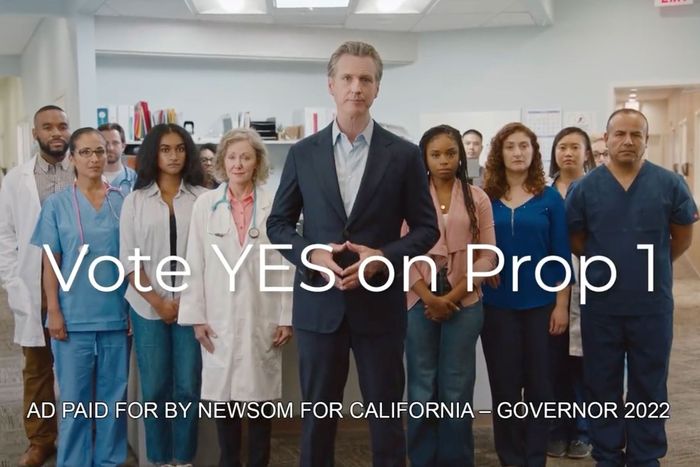
When Gavin Newsom started deploying billboards in seven red states advertising California as an abortion-rights sanctuary, the standard cynical reaction was that the famously ambitious politician was laying the groundwork for a presidential bid in 2024 or later. You can’t say that about his latest abortion-related expenditure of reelection-campaign funds, though: an ad rollout strictly for Californians urging a “yes” vote on Proposition 1, a ballot initiative amending the state constitution to enshrine abortion rights.
To be clear, the governor doesn’t need to run any ads to get himself reelected. He’s very comfortably ahead of Republican Brian Dahle in a state that is emphatically Democratic (the GOP badly lost in its best opportunity to dislodge Newsom, the 2021 recall election). For that matter, there is zero doubt Prop 1 is going to pass. A September poll from the Public Policy Institute of California showed the initiative leading among likely voters by a 69-25 margin (even one-third of self-identified Republicans supported it, according to this and other polls).
Newsom is spending money promoting Prop 1 for the very good reason that it’s a turnout generator for the Democratic-leaning voters who could also help the party win close congressional, state legislative, and local government contests. That’s why Democrats in other states are figuring out how to get an abortion referendum on their own ballots — if not in 2022 (where it will appear in one shape or another in Kentucky, Michigan, Montana, and Vermont as well as California), then in 2024, as the Washington Post reports:
While in the early stages, discussions around whether to pursue an abortion rights ballot measure are occurring in states including Ohio, Florida, Arizona, Oklahoma, Colorado and Missouri, according to interviews with over a dozen advocates, liberal groups and others, some of whom spoke on the condition of anonymity to detail private conversations. One person familiar with the discussions said at least a dozen states are exploring — or are expected to soon explore — whether a citizen-led petition is a viable path to restoring or protecting abortion access in their state.
“Every state that has access to direct democracy as a tool will consider if that is a strategy that makes sense for 2024, for 2026 and beyond,” said Sarah Standiford, the national campaigns director at Planned Parenthood Action Fund.
States with Democratic-controlled legislatures may also act to create abortion-rights ballot measures in future years. And it’s possible that anti-abortion activists and legislators may miscalculate and create a ballot test on abortion that they will proceed to lose. That famously happened in Kansas in August and could happen in November in Kentucky and/or Montana.
It’s ironic, really: For decades, the anti-abortion movement claimed it wanted nothing more than to abolish the illegitimate judicial usurpation of abortion policy-making and “return it to the people” where it belonged. Now that the U.S. Supreme Court has done just that in the Dobbs decision, it turns out that, in many places, “the people” want to choose reproductive rights and, in doing so, have boosted the electoral prospects of the pro-choice party. In this as in many other respects, the anti-abortion GOP is the eager dog that finally caught the bus.
More on Politics
- Trump Is Threatening to Invade Panama, Take Back Canal
- Everyone Biden Has Granted Presidential Pardons and Commutations
- What Happened to Texas Congresswoman Kay Granger?






























